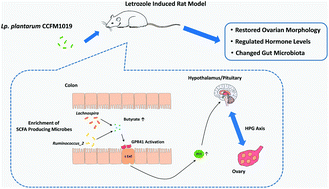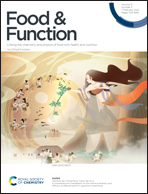Lactiplantibacillus plantarum CCFM1019 attenuate polycystic ovary syndrome through butyrate dependent gut–brain mechanism†
Abstract
Polycystic ovary syndrome (PCOS) is an endocrine disorder that affects women of reproductive age. The gut microbiota has been shown to play a vital role in the pathogenesis of PCOS. Agents that target microbes in the gut may be promising therapeutic strategies for PCOS. Herein, a letrozole-induced PCOS model was used to test five Lactiplantibacillus plantarum strains for their ability to alleviate PCOS symptoms and their effect on the gut–brain axis. Lp. plantarum CCFM1019 attenuated the pathological changes in the ovaries and restored testosterone and luteinising hormone levels. However, metabolic disorders induced by letrozole treatment were not significantly reversed by these strains. Meanwhile, alteration of gut microbial diversity and enrichment of the short-chain fatty acid producers Lachnospira and Ruminococcus_2 were observed after Lp. plantarum CCFM1019 intervention. Compared with letrozole-treated rats, those treated with Lp. plantarum CCFM1019 exhibited higher butyrate and polypeptide YY levels, possibly due to the regulation of G protein-coupled receptor 41 expression. These results demonstrated that Lp. plantarum CCFM1019 attenuated letrozole-induced PCOS symptoms in rats. A butyrate-dependent gut–brain mechanism may be involved in this protective effect.



 Please wait while we load your content...
Please wait while we load your content...